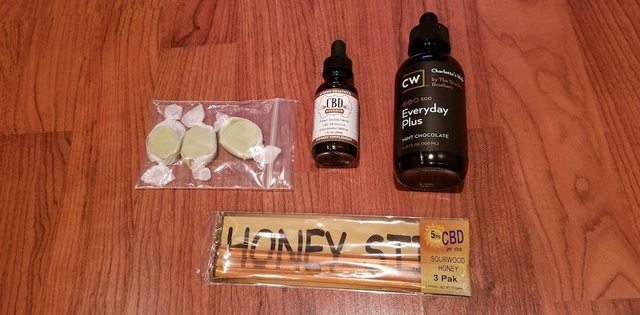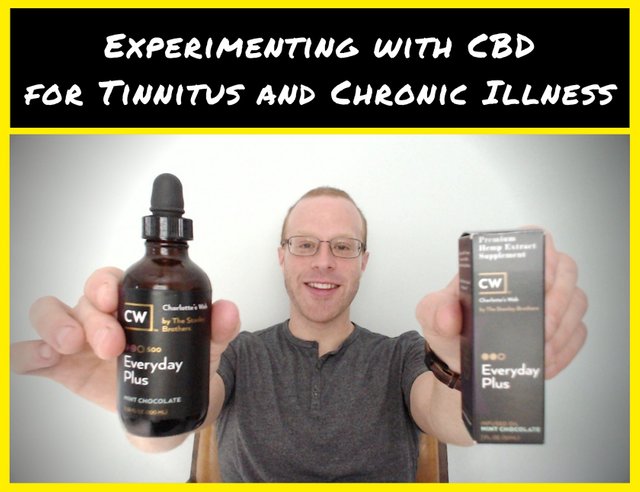Experimenting with CBD Oil for Tinnitus and Chronic Illness (Hint: It Works!)
DISCLAIMER: I AM NOT A DOCTOR or a medical health professional. Always speak with your doctor before trying any new drug, supplement, or treatment.
If you follow any of the chronic illness Facebook groups, you’ve probably seen a lot of talk about a supplement called Cannabidiol (CBD for short).
For a while now, CBD has been on my radar. And not just from the support groups. I've seen so many headlines praising CBD for it's seemingly endless list of potential benefits. So I decided to try it for myself.
I’ve been taking CBD oil every single day for the last few months, and I have to say, I’m beyond impressed!
But first, let’s start with the basics.
CBD Basics:
CBD is one of 113 different cannabinoids found in the marijuana plant. On its own, it’s non-psychoactive which means you will not get high from consuming CBD. Yet it’s believed to be responsible for many of the medicinal effects of cannabis.
Studies have shown CBD to have a wide variety of medicinal properties, from anti-inflammatory to anti-anxiety and anti-nausea. It's also neuroprotective, has pain-killing properties, and can help to lower blood pressure, amongst many other benefits.
Products and Consumption:
CBD is a component of marijuana and hemp, but it can also be extracted and taken on its own as a supplement.
Because of this, as long as a CBD product contains .3% THC or less, it’s considered to be a hemp product, and is legal in the US and many other countries.
(It’s worth noting that hemp seed oil is a different thing altogether, and contains little to no cannabidiol. So hemp seed oil is not what we’re talking about here today.)
There are many different forms of CBD products available on the market, from isolated CBD powders, to food products, vape ready concentrates, as well as full spectrum plant tincture oils, which is primarily what I’ve been using.
 And there are also multiple ways to ingest CBD. It can be consumed orally, vaped or smoked and absorbed through the lungs, or taken sublingually and absorbed through the capillaries under the tongue.
And there are also multiple ways to ingest CBD. It can be consumed orally, vaped or smoked and absorbed through the lungs, or taken sublingually and absorbed through the capillaries under the tongue.
For the sake of this post, however, I will be focusing on my experiences with full spectrum hemp oil, of which, CBD is the primary component.
And I have to say, my experiences have been incredible.
What it's like:
To be clear, CBD does not seem to have any direct effect on either my tinnitus or Meniere’s disease symptoms.
But indirectly, it’s a Godsend, because it reduces my anxiety and stress more than anything else I’ve ever tried by far. And when my stress and anxiety levels go down, my tinnitus is so much quieter and my Meniere’s symptoms improve.
When I first tried CBD, I was having a lot of anxiety. I've been dealing with an ongoing neck injury, and after getting a massage, I noticed they were selling the Charlotte’s Web brand of CBD oil (sign up page for 5$ off) at the spa.
I had heard of this brand before, and I was curious, so I decided to give it a shot. And within 15-20 minutes of ingesting it, my anxiety was gone. Not just diminished, but gone - entirely.
It’s hard to describe what it feels like, because honestly, I’ve never felt anything quite like it before.
An amazing experience:
The first thing I noticed was a subtle but wonderful feeling in my body. My muscles were relaxed and I felt great physically. Almost immediately, the physical symptoms of my anxiety went away. The uncomfortable tension in my chest and stomach disappeared.
Mentally, I was calm and focused, but more importantly, I was not impaired. Though I realize now that the recommended dosage I took initially was much more than what I actually needed.
At these higher doses, I noticed a slight, somewhat uncomfortable pressure on my head. It was also a bit sedating, as well.
I ultimately found that I needed much less to control my anxiety, with as little as 25% of my initial dose being just as effective but without the side effects. Finding the right dosage seems to involve a lot of trial and error for most people.
The CBD has also greatly improved my sleep. But again, I think this is more a product of the stress and anxiety relief than anything else. It’s much easier to fall asleep when your body is calm and your mind isn’t racing.
Your milage may vary:
Everyone seems to have a different experience with CBD.
Many people do experience the benefits immediately, like I did, while for others it’s a cumulative effect, requiring daily consumption. And some people don’t really notice any effects at all.
But my experience has been transformative, because I’ve struggled with anxiety for most of my life. Finding a tool like CBD that provides such a remarkable level of relief is wonderful beyond words!
How to purchase CBD?
There are quite a few reputable vendors with very high-quality CBD products offered at reasonable prices. I say reasonable because even when the pricing is competitive, CBD isn’t cheap.
And the cost is certainly prohibitive. I have a feeling that it’s going to be more accessible as time goes on, but for now, you can expect to pay anywhere between 25¢ and $3.00+ per dose depending on the concentration, how much you need to take, and how much you purchase at once.
But at the end of the day, it’s been worth it for me and I plan to continue to use it on an as-needed basis.
And it just be worth it for you too.
Reputable Vendors:
CWHemp - This is one of the products I've been using - Charlottes Web Everyday Plus strength hemp oil. If you sign up here you can get $5 off your first purchase!
CBDistillery - CBDistillery is another fantastic company with a little bit more reasonable pricing and a larger product line. (Offer code CBD-TINNITUS for 5% off!)
Australia: Drhemp (CWHEMP), HempNeeds
Canada: Available through the Medical Marijuana System
More Information about CBD:
CBD: Everything You Need To Know About Cannabidiol

I have tinnitus since January last year. Consuming thc and cbd doesn't help for me.
It makes you relax so for people who panic from tinnitus it might be helpful but it's not something that will cure it.